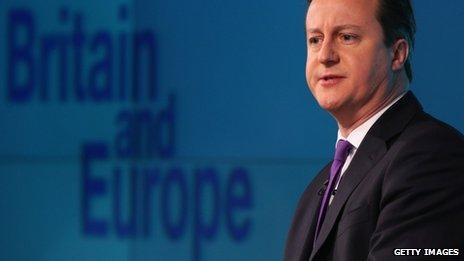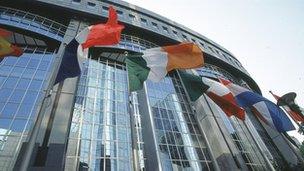David Cameron speech: PM 'trying to ride two horses'
- Published

David Cameron estimates other EU members may be persuaded to grant concessions to ensure the UK stays in the club.
All political parties are coalitions of the more or less willing.
They sidestep internal differences - sometimes substantial differences - in pursuit of the greater goal of securing popular support and thus power for their party.
Sometimes sustaining that coalition becomes impossible.
A particular issue gains such traction that it overwhelms internal consent and the coalition of the willing fractures. That happened to the Tories over free trade.
It happened to the Liberals over Irish Home Rule.
For some time now, since John Major faced a revolt over Maastricht, the issue of the European Union has threatened to divide the Tories.
For some Conservatives, it has become more important to be "right" over Europe - as they would see it - than to maintain the Tories in long-term power.
That is not to say they have entirely abandoned their customary loyalty. They hear Disraeli's maxim: "Damn your principles, stick to your party."
But the consequences of EU membership so enthral them, the terms of EU membership so appal them, that they feel they cannot stay silent in pursuit of the wider party interest.
They know it is electorally damaging - but the issue trumps that perception.
To be clear, this is potentially true for all parties, at all times.
On a much lesser scale, look at the resignations from the SNP group at Holyrood which followed the party's decision to back NATO membership. For the two who quit, the issue overtook support for their leadership.
David Cameron glances back to John Major's premiership and ponders.
He reflects upon the succession of Conservative leaders who followed Major and who failed to build the party into an election winning prospect.
He considers the emerging - indeed, the emerged - threat from UKIP on a platform largely consisting of opposition to the European Union.
And David Cameron concludes that he has to offer a referendum on EU membership midway through the next Westminster Parliament if he is to stand a reasonable chance of leading the principal party in that Parliament and thus forming the government.
There is a further calculation here.
As with political parties, so conjoined organisations like the EU are coalitions of the more or less willing. In Britain's case, perpetually less, it would seem.
Politically, David Cameron wants and needs a renegotiation of Britain's terms, either unilaterally or, he hopes, as part of a wider redrafting of the EU treaties.

Alex Salmond says Tory Euroscepticism poses the biggest threat to Scotland's position in the EU
His estimation is that the other EU members, wrestling with the overall shape of the Union, may be persuaded to grant the concessions which would help ensure that the UK remains within the club.
This is a political calculation, a gamble if you like.
The other nations will be exasperated at what they see as British vacillation - and they may choose to express that exasperation by thwarting Mr Cameron's demands.
Or they may give way, grudgingly and to a limited extent.
But, for David Cameron right now, it is a simpler matter than that postponed calculation.
He reckons his chances of winning the next UK general election - and thus remaining at the EU negotiating table at all - are much reduced if he does not immediately address the issue which is dividing his party.
In Scotland, there is an unintended - but by no means unforeseen - consequence of all this.
This is that it may well now prove much more difficult for the Prime Minister and the Tories to challenge the Scottish Nationalists upon the issue of EU membership.
'Persistent undercurrent'
To date, they have pursued this topic with vigour.
They have said that the SNP cannot guarantee Scottish membership of the EU, post independence.
The Nationalists have, of course, contested that vigorously but, at the very least, the issue gained some traction.
Now what do the Tories say on this topic?
Reject the SNP, stick with the UK - and we will offer you the prospect that a vote across the whole of these islands may take you out of the EU, perhaps in contradistinction to opinion in Scotland.

The PM concludes he must offer an EU referendum midway through the next Westminster Parliament
Alex Salmond says that, "the persistent undercurrent of Tory Euroscepticism poses the biggest threat to Scotland's position in the EU."
He also characterises Mr Cameron as riding two horses, simultaneously appeasing Euroscepticism while portraying himself as a positive EU reformer.
Mr Salmond reckons the PM risks a fall.
Another point arises with regard to this. Mr Cameron's promised referendum in the next Parliament would, he envisages, follow a process in which Britain renegotiates the terms of EU membership with a renewed emphasis upon the powers of individual member states rather than Brussels.
He says that is preferable to a vote now upon EU membership.
The PM asks: "How can we sensibly answer the question 'in or out' without being able to answer the most basic question: 'what is it exactly that we are choosing to be in or out of'?"
In response to which, Mr Salmond might query when the Tories plan, in comparable fashion, to state the revised terms of Holyrood power which the Scots could expect should they reject independence?